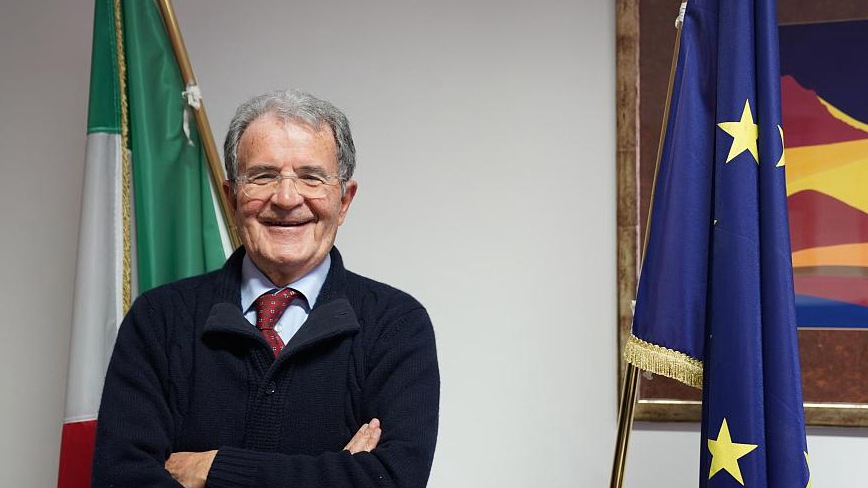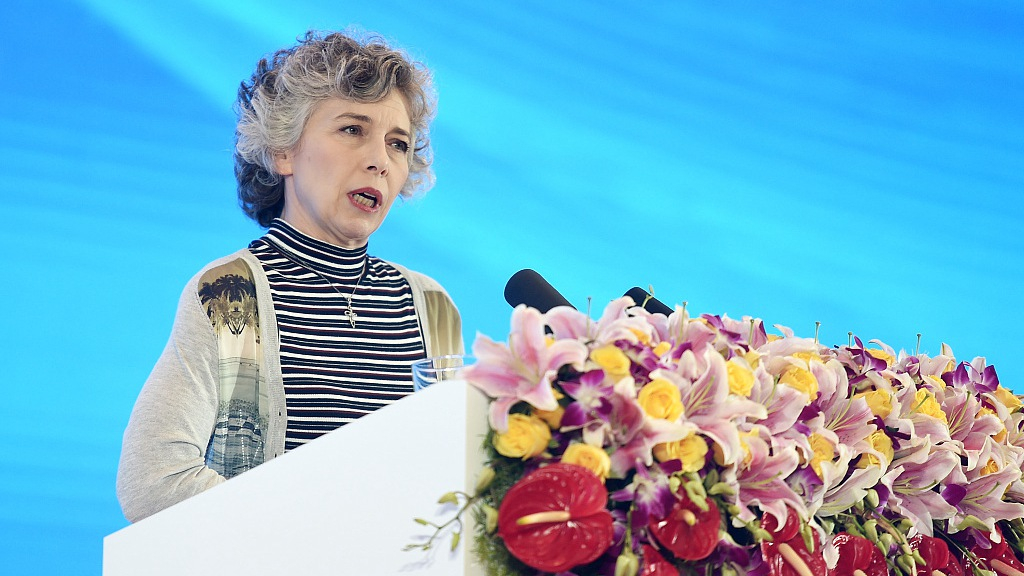Editor's note: Hu Hong is an assistant research fellow at the Department for European Studies at the China Institute of International Studies. The article reflects the author's opinion, and not necessarily the views of CGTN.
Chinese President Xi Jinping started his
three-nation visit in Europe from Italy on March 21. China, as President Xi writes on the famous Italian newspaper Corriere Della Sera, together with Italy, could set out the guidelines for bilateral relations and take them into a new era.
Among all the bilateral issues between China and Italy, the Belt and Road Initiative (BRI) seems to become the focal point of the coming visit. Recent days, news concerning the possible signing of a memorandum of understanding (MoU) between China and Italy on co-building the BRI is widespread over both western and Chinese media and social networks. Journalists have raised related questions to Foreign Ministry spokespersons for several times.

The Italian Vulcan aircraft arrives in Chengdu by the China Europe train, March 1, 2019. After the first batch of Vulcan V1.0 aircraft was successfully delivered, the remaining products will arrive through the China Europe train in quantities. /VCG Photo
The Italian Vulcan aircraft arrives in Chengdu by the China Europe train, March 1, 2019. After the first batch of Vulcan V1.0 aircraft was successfully delivered, the remaining products will arrive through the China Europe train in quantities. /VCG Photo
It is not surprising such news catching people's eyes. As a Group of Seven country and also a founding member of the European Union, Italy represents the most traditional "West."
Therefore, some people, especially those still believing in power politics and immersing in Cold-War mindset, will find it difficult to imagine Italy embracing the BRI, a project promoted by the "East" in their eyes. There are also some concerns from the EU side that Italy's joining BRI might give Beijing an upper hand when dealing with the EU and further weaken European unity on the foreign policy of member states.
These concerns represent the continuity of the doubts of the BRI since its very beginning. People have politicized the BRI too much to think over its rational and economic logic. However, if people could look into the economic logic of the initiative, more opportunities are in the initiative than challenges.
This is how Italy sees the initiative and why it
decides to join. Like Italian Prime Minister Giuseppe Conte said, "Italy's accession to a new silk route represents an opportunity for our country." Conte also added, "We want to first and foremost rebalance our trade, which is not favorable to us now. Our exports to China are far lower than other European countries."
Possible cooperation over the BRI between the two countries provides opportunities for China and Italy. Firstly, like President Xi writes in his article, the interconnection of BRI and Italian project of "Construction of Northern Ports" and "Investment in Italy" would bring more potential cooperation projects on navy, aeronautics, aerospace and culture.

Former Italy Prime Minister Romano Prodi believes that Xi's visit will put strong impetus to the bilateral economic investment and people-to-people exchanges during his interview with China News Service, March 20, 2019. /VCG Photo
Former Italy Prime Minister Romano Prodi believes that Xi's visit will put strong impetus to the bilateral economic investment and people-to-people exchanges during his interview with China News Service, March 20, 2019. /VCG Photo
Chinese investment and commodities could reach further into the Italian market. Secondly, as some Italian scholars and officials said, the BRI should be a two-way street. Italian companies, especially small and medium enterprises, are not as competitive as their German or French counterparts in China.
Thus, they would very much like to seize this opportunity of BRI and also the reform and opening-up of China, to explore the potential of the Chinese market. Thirdly, cooperation with Italy could be an opportunity for the BRI itself. The signing of MoU is only a start. The collaboration between China and Italy on BRI will attract more attention from the whole world than the previous cooperation.
Therefore, if both sides could seize the opportunity and successfully implement win-win cooperation, it could become a model project of BRI then help rebrand the BRI and increase its attractiveness.
Cooperation on BRI could help correct its own weakness and flaws. The Chinese government never denies it and always welcomes different parties to jointly promote and build the initiative. Conte has promised to take EU trade standards to BRI, and this is also another way of co-building the BRI.

Former President of the Italian Chamber of Deputies Irene Pivetti gives a keynote speech on 2018 "Belt and Road" Business Leaders Summit, Chengdu, Sichuan province, September 21, 2018. /VCG Photo.
Former President of the Italian Chamber of Deputies Irene Pivetti gives a keynote speech on 2018 "Belt and Road" Business Leaders Summit, Chengdu, Sichuan province, September 21, 2018. /VCG Photo.
In last years‘ China's Policy Paper on the European Union, when talking about the BRI, words like “facilitates green development and upholds high ethical standards” have been put into the context which also reflects requirements from the European side.
Therefore, people worrying China may “divide and rule” Europe via the BRI may feel relieved. As State Councilor and Foreign Minister Wang Yi said, choosing Europe for President Xi's first overseas trip this year fully shows the great importance China attaches to Europe.
Chinese side firmly supports the European integration process, firmly supports the EU in staying united and becoming stronger, and firmly supports Europe in playing a more important role in international affairs. These “three supports” is and will be the Chinese strategic choice.
While BRI is becoming the highlight of the visit, many other bilateral and multilateral issues are of the same or even greater importance for China and Italy. Globally, both sides are important players in the framework of G20 and thus share the responsibility of protecting peace, stability and prosperity. Bilaterally, as the emblems of eastern and western civilizations, China and Italy should tighten ties from the highest level to the common people, thus building the bridge of not only BRI but also the civilizations.
(If you want to contribute and have specific expertise, please contact us at opinions@cgtn.com.)





